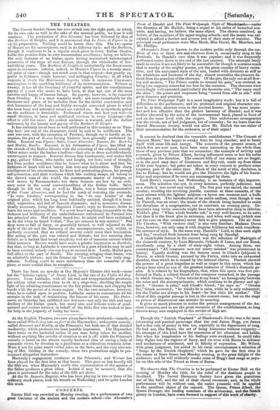It cannot be doubted that the venerable establishment "The Concert
of- Ancient Music," has begun to awake from its long slumber, and to bestir itself with some life and energy. The concerts of the present season, of which five are now past, have been more interesting on the whole than those of any previous year that we remember- the example of activity sad research, given by Prince Albert, having influenced more or less his noble colleagues in the direction. The concert-bills of one season are no longer,- as in the good easy days of Greatorex and Knyvett, made up from those- of the year bygone; but pains are taken at every concert to produce some forgotten gem of the olden time. Much of the merit of this, doubtless, is due to Bishop; but be would not give the Directors the light of his know- ledge and experience if he were not encouraged by them.
Lord Ilowe's concert, last Wednesday, is an instance of this improve- ment. The selection was not, in every instance, perfectly judicious; but as a whole it was novel and varied. The first part was sacred, the second secular; avoiding the revolting jumble, common at these concerts, of the most solemn with the lightest subjects—a hymn one moment and a buffo duet the next. The introduction of an entire anthem, even though it was by Purcell, was an'error; the music of the church being intended to assist the devotions of a congregation, not to entertain an evening party. Ge- ininiani's long violin concerto might have been allowed to sleep in oblivion. Webbe's glee, "When winds breathe soft," i very well-known, to be ante; • but then it is the finest glee in existence, and when well sung (which was not the case on this occasion) never fails to give pleasure. The air from The Creation, "With verdure clad," is also very familiar; Madame Dorus Gras, however, not only sang it with singular brilliancy but with considera- ble newness of style. In the same way, Handel's "Lord, to thee each night and day," received fresh interest from being sung by Staudigl.
A remarkable feature in the concert was the selection of Madrigals of the sixteenth century, by Luca Marenzio, Orlando di Lasso and our Benet, excellently sung by a choir of sixty-eight voices. Among them, our countryman's "All creatures now are merry-minded" was preeminent in beauty. Equally striking was the famous scene in Gluck's lphigenia Tenth, in which Orestes, pursued by the Furies, sinks into an exhausted slumber, from which he is roused by the infernal chorus. Pischek showed the powers of a great tragedian as well as singer in this scene which has
always been cited as one of the greatest instances of Gluck's dramatic ge- nius. It is related by his biographers, that, when this opera was first per- formed in Paris, a critical friend of the composer remarked, in the passage in which Orestes says, "Calm returns tb my heart," an incongruity between the voice and the accompaniments which continue to be gloomy and agi- tated. " Orestes is calm, said Ginck's friend; "he says so." " Orestes lies," Gluck answered; "he thinks be is calm while he is only exhausted; but the Furies are always in his heart—he has slain his mother." The effect of this singular promage is lost in the concert-room; but on the stage no person of discernment can mistake its meaning.
It gives us much pleasure to notice the present management of the An- cient Concerts, and to see the great resources of the establishment, so long thrown away, now employed in the service of high art.
























 Previous page
Previous page